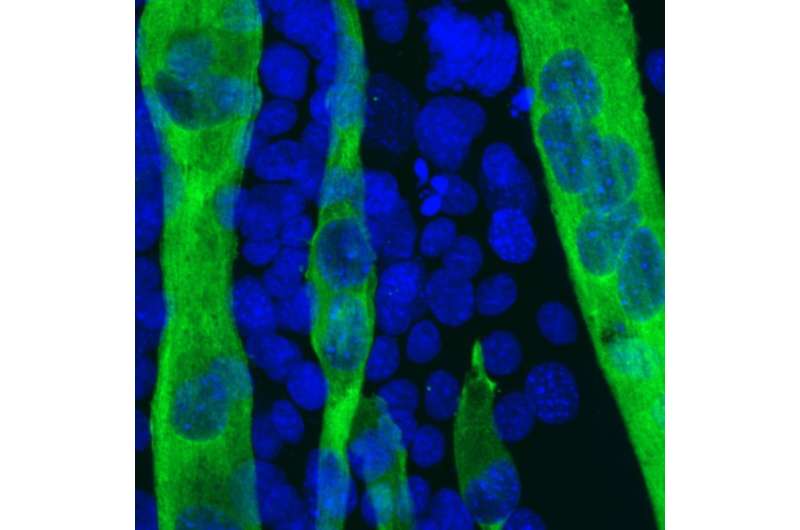Prox1 is essential for differentiation of skeletal muscle stem cells called satellite cells. During differentiation satellite cells form long, multinuclear myotubes, but if they lack Prox1 gene, they fail to differentiate. In the figure myosin protein in differentiated myotubes have been stained green. Credit: Riikka Kivelä
Prox1 gene has long been known to play an important role in fetal development. Finnish researchers have now discovered that Prox1 is essential also for skeletal muscle stem cell differentiation.
Skeletal muscles are important not only for locomotion but also for the regulation of whole-body metabolism. Muscles have remarkable capacity to regenerate after injury and to adapt in response to exercise training.
Prox1 gene has an important role in fetal life for the development of the liver, lymphatic vessels and lens in the eye. The gene also has a dark side – it plays a central role e.g. in the development of colorectal cancer (Cell Reports 2014).
Researchers from Wihuri Research Institute and the University of Helsinki, Finland, have now found that skeletal muscle stem cells called satellite cells also express the Prox1 gene. The new surprising results of the study, published in Nature Communications, show that satellite cells differentiate into myofibres only when Prox1 is active.
The researchers found that Prox1 was also expressed in adult slow muscle fibres, which have good endurance capacity and high metabolic activity. About half of the skeletal muscle fibres in adults are slow fibres.
"Prox1 gene transfer into fast muscles converted them towards the slow fibre type in mice, whereas Prox1 deletion increased the activity of fast fibre genes," says the lead author, Academy Research Fellow Riikka Kivelä.
"Our new findings on the essential role of Prox1 in satellite cell differentiation and slow muscle fibre type maintenance provide an important novel avenue for studies in muscle and metabolic diseases, such as type 2 diabetes. In humans, Prox1 gene polymorphism has been linked to increased risk for type 2 diabetes," Kivelä says.
More information: Riikka Kivelä et al. The transcription factor Prox1 is essential for satellite cell differentiation and muscle fibre-type regulation, Nature Communications (2016). DOI: 10.1038/NCOMMS13124
Journal information: Cell Reports , Nature Communications
Provided by University of Helsinki




















